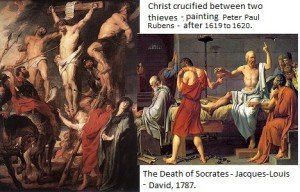
Arquivo para March 25th, 2016
The cross, death and philosophy
The are mistaken who think that the Good Friday where there is the kiss on the cross, is  something unique religious or death and never cross were philosophical issues.
something unique religious or death and never cross were philosophical issues.
Socrates has in thinking about death something essential because it allows the soul to move away from the organic matter and penetrate an essential sphere where is the true knowledge, and therefore only then reach the knowledge of pure form: wisdom, for it was ready to die and not by chance, taking hemlock died, his cross.
In it the man’s vision is guided by a genius or “daemon” that will guide you through the material stage toward Hades, the realm of the dead, where is subjected to a necessary judgment (sic) and after interning there be reborn in a physical body, here distance of Christ.
There is something in Socrates almost unnoticed but essential, for him the truth is not with men, but “between” the men, we could say an alter-ontological category, and philosophy continues to explore the theme of Plato (428-347 BC) Heidegger (1889-1976) the subject.
Schopenhauer (1788-1860) is one of the breaks with the traditional modern thought, said: “Death is the muse of philosophy, and so Socrates defined it as preparation for death ?. Without death, it would be really hard to if it had philosophized. ”
If existence is a fact, death too, so being is more than exist, although the philosophy confuse the two, and be may be something that goes beyond death, then there would be something on the other side, but the passage is cross, pain says the Christian message in its maximum master nailed to a cross, perhaps the answer is there in the paradox: life beyond death in pain, but a pain that has meant the deepest love: give his life for similar.
The Socrates (The Death of Socrates – Jacques-Louis David, 1787) seems to say your phrase “Ignorance is the only evil,” and the crucified Jesus framework ( “Christ crucified between two thieves,” Peter Paul Rubens painting ) seems to say “loving, he loved everyone.”

